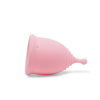As we commemorate World Earth Day, it's crucial to highlight sustainable choices that benefit both our bodies and the planet. Amidst the push for environmental consciousness, the realm of feminine hygiene has undergone a remarkable transformation. Traditional period products often contribute to environmental degradation through excessive waste generation. However, the rise of eco-friendly alternatives like period underwear and menstrual cups offers a beacon of hope for a greener future.
-
The Environmental Toll of Traditional Period Products:
- Traditional menstrual products, including pads and tampons, are predominantly composed of non-biodegradable materials such as plastic and synthetic fibers.
- Disposable pads and tampons contribute significantly to landfill waste, taking centuries to decompose and releasing harmful chemicals into the environment during their breakdown process.
- The production process of conventional period products consumes vast amounts of water and energy, further exacerbating their environmental footprint.
-
Empowering Women with Sustainable Solutions:
- Period underwear, also known as menstrual panties, offers a reusable and washable alternative to disposable pads and tampons. Crafted from soft, absorbent fabrics, these panties provide leak-proof protection without the need for single-use products.
- Menstrual cups, made from medical-grade silicone, offer a sustainable option for managing menstrual flow. These flexible cups can be worn for up to 12 hours and last for years with proper care, significantly reducing waste accumulation.
- Embracing eco-friendly period products not only minimizes environmental impact but also promotes economic empowerment by eliminating the recurring cost of disposable options.
-
Advocating for Sustainable Menstruation:
- Educating individuals about eco-friendly period products is essential for fostering widespread adoption and acceptance.
- Initiatives aimed at destigmatizing menstruation and promoting sustainable menstruation practices play a pivotal role in driving societal change.
- Collaboration between governments, organizations, and menstrual product manufacturers can facilitate access to affordable and eco-friendly alternatives for menstruators worldwide.




Leave a comment